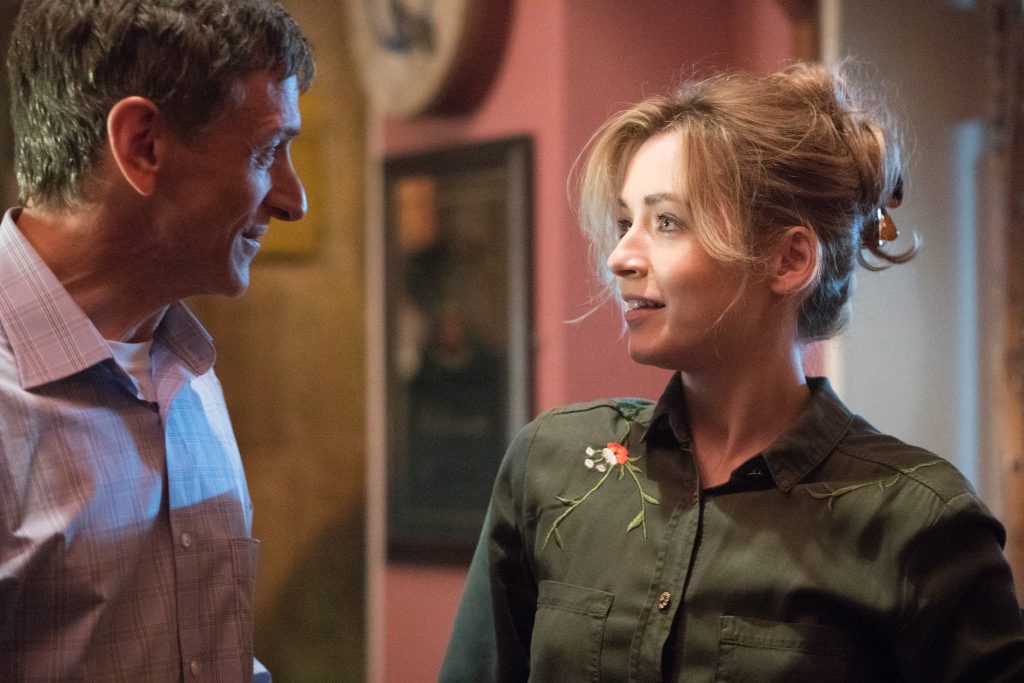June 12, 2020
by Carla Hay

Directed by Kenneth Branagh
Culture Representation: Taking place in Ireland and a magical underground world, the fantasy adventure “Artemis Fowl” has a racially diverse cast of characters (white, black and Asian) who portray humans, fairies, dwarves and goblins.
Culture Clash: A 12-year-old boy named Artemis Fowl, who must save his kidnapped father from an evil fairy, kidnaps a good fairy as bait for the ransom, setting off a battle between fairies and humans.
Culture Audience: “Artemis Fowl” will appeal primarily to fans of the “Artemis Fowl” book series who won’t mind watching a movie adaptation that is inferior to the books’ storytelling.

The “Harry Potter” books and films have set the bar pretty high for what can be achieved in making young-adult fantasy novels into movies. By comparison, “Artemis Fowl” is a mediocre mess of a film that clearly spent a lot of time on visual effects but not enough time in doing justice to the kind of storytelling that author Eoin Colfer has in his “Artemis Fowl” books. Almost everything that happens in the “Artemis Fowl” movie can be predicted by people in their sleep.
The long-delayed “Artemis Fowl” movie was supposed to be released in theaters, but instead was released directly to the Disney+ streaming service, due to the coronavirus pandemic. Directed by Kenneth Branagh (who’s hit-and-miss artistically when it comes to his big-budget films), “Artemis Fowl” isn’t the worst fantasy film that someone can ever see, but it’s a disappointing movie, considering the level of talent involved. Conor McPherson and Hamish McColl wrote the clunky “Artemis Fowl” screenplay, which is supposed to be an origin story, but the movie is highly unlikely to get a sequel.
The story takes place in Ireland, in an alternate modern reality where humans live above ground, while fairies and other creatures live in a below-ground place called Haven City. The movie begins with the news media in a frenzy because several priceless artifacts from around the world have been stolen. The chief suspect is a reclusive businessman/art dealer named Artemis Fowl Sr. (played by Colin Farrell), who lives in a mansion called Fowl Manor and who has mysteriously disappeared.
However, a suspected accomplice has been arrested: an oversized, thieving dwarf named Mulch Diggums (played by Josh Gad), who’s self-conscious over the fact that he’s much taller and bigger than the average dwarf. Mulch is taken to the MI6 Red Fort Interrogation Unit in Thames Estuary, London, where he begins to tell the story of Artemis Fowl Jr. (played by Ferdia Shaw), a precocious 12-year-old loner who’s frequently left to his own devices because his father goes away for long periods of time on secretive trips.
The Artemis Fowl father and son have a close relationship, but Artemis Jr. feels hurt and left out that his father won’t tell him where he’s going on these trips and exactly when he’ll be back. (Artemis Jr.’s mother is not seen or mentioned in the story.) Artemis Jr. has a friend/mentor/bodyguard named Domovoi Butler (played by Nonzo Anozie), who tells people that he hates to be called a butler. Domovoi has a relationship with Artemis Jr. that’s similar to the “Batman” story relationship between Alfred the butler and Bruce Wayne/Batman.
As Mulch tells it, Artemis Jr. doesn’t like school very much. He’s considered “different” and has found it difficult to make friends. There’s somewhat of an unnecessary scene where Artemis Jr. is talking to a school counselor, and then Artemis storms out because he thinks the counselor doesn’t understand him and the session is a waste of time.
Considering that Artemis Jr. spends the rest of the movie fighting battles like an adult, going to school isn’t a priority to him. It also didn’t make sense to show him at school in this movie because a kid like Artemis Fowl would probably be homeschooled, considering his father’s secretive and reclusive life. Why bother with nosy teachers and students?
At any rate, Artemis Jr. soon gets a phone call from the evil fairy who’s kidnapped his father. Let that sink in for a few seconds and try not to laugh at how dumb that plot sounds. We’ll have to assume they have caller ID blocking in Haven City.
The evil fairy tells Artemis Jr. that his father will be killed unless the fairy (an unnamed androgynous creature who’s in disguise with the creature’s face obscured) gets the ransom: a magical object called the Aculos, which has the power to open portals across the universe. The evil fairy tells Artemis Sr. that he’s been kidnapped as revenge for causing the deaths of some other fairies.
Artemis Jr. then comes up with a somewhat convoluted plan to get the good fairies of Haven City to help him find the Aculos. How? By kidnapping a fairy named Holly Short (played by Lara McDonnell), an enforcement officer who’s supposed to be 84 years old in fairy years, but she looks close to the age of Artemis Jr. (All of the fairies are human-sized.)
The good fairies, led by gravel-voiced Commander Root (played by Judi Dench, in yet another no-nonsense, unsmiling role), then descend upon Fowl Manor to rescue Holly. The fairies have the magical power of creating a force field around a certain area, where everyone in the force field can be temporarily frozen and have their memories erased.
This power is demonstrated in a scene where a giant troll crashes a wedding reception in Italy and attempts to kidnap a child and the good fairies come to the rescue. It’s an example of how this unfocused movie literally jumps all over the place.
But apparently, having magical powers isn’t enough for the fairies, because they also have a massive technology center at Haven City, complete with huge video monitors and computers. How very Earth-like. Except it’s not, because their chief technology officer is a fairy centaur named Foaly (played by Nikesh Patel).
And who else has teamed up with Artemis Jr. and Domovoi to help them fight off this large army of fairies? Domovoi’s 12-year-old niece Juliet Butler (played by Tamara Smart), who’s got martial-arts combat skills. The three allies are outnumbered, but they have some tech gadgets and guns for their battles—although the guns don’t seem to actually kill anyone, because Disney can’t have a movie with 12-year-old kids on a murder spree.
Mulch’s narration comes and goes in the story, which includes a scene of Mulch in a prison cell full of goblins who are hostile to him. It’s an example of a poorly written scene that seems to have no purpose other than to show Mulch in an uncomfortable situation and the visual effects of when he uses his magical ability to over-expand his mouth.
All of the actors do a serviceable job in their roles, although McDonnell frequently outshines her co-stars in her scenes. There are a few lines that might give people a chuckle, such as when a gruff Commander Root barks to subordinates, “Get the four-leaf clover out of here!” The way she slightly pauses before she says “four-leaf clover” makes it clear she could have said another “f” word, and then it would definitely not be a Disney movie.
The visual effects and production design of “Artemis Fowl” are good enough, but they won’t be nominated for any major awards. Because there is so little character development in the movie, the action scenes are really what bring the most appeal to the film. Kids under the age of 10 might enjoy “Artemis Fowl,” but people with more discerning taste in fantasy films won’t find “Artemis Fowl” very impressive. “Artemis Fowl” might just make people want to watch an old “Harry Potter” movie instead.
Disney+ premiered “Artemis Fowl” on June 12, 2020.



